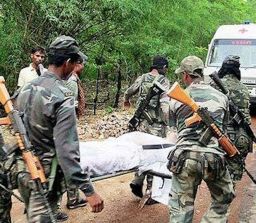India’s decades-long Maoist insurgency has claimed more lives in what Prime Minister Narendra Modi denounced as a “cowardly attack.”
At least 25 police officers were killed and six others injured Monday when hundreds of suspected Maoist rebels attacked a convoy in central India, officials told CNN.
Since 2010, Maoist rebels have killed about 2,100 civilians and 800 security force personnel as part of their ongoing conflict with the Indian government, according to official figures.
Indian Maoist – or Naxalite – groups have been active in the country since the 1960s, but the modern insurgency did not begin until the early 2000s with the emergence of the Communist Party of India (Maoist) and its armed wing, the People’s Liberation Guerrilla Army.
‘Cowardly’ attack
According to police superintendent Jitendra Shukla, around 70 members of India’s Central Reserve Police Force (CRPF) were patrolling a road construction project in Chhattisgarh state’s Sukma district when they were ambushed.
The security forces were hit by heavy gunfire from about 500 Maoist rebels hidden in the dense forests they were passing through, CRPF spokesman Siroj Kujur told CNN.
Kujur said 23 officers died at the scene, and two died later in the hospital. Six officers were also injured in the attack.
Prime Minister Modi said the attack was “cowardly and deplorable.”
“We are monitoring the situation closely,” he said on Twitter. “The sacrifice of the martyrs will not go in vain. Condolences to their families.”
This is the second attack on CRPF troops in Chhattisgarh in less than two months. In March, 12 officers died in a suspected Maoist attack on another convoy in the same district.
The death toll in Monday’s incident compares to a 2013 attack on a government motorcade that killed 24 and injured more than 30.
Long-running insurgency
According to the New Delhi-based Institute for Conflict Management (ICM), Maoist groups are currently active in 156 districts of 13 states across India.
Former Indian Prime Minister Manmohan Singh once described Maoist rebels – who are well organized and trained – as the country’s “gravest internal security threat.”
According to the Indian Ministry of Home Affairs, the CPI (Maoist) “aims to overthrow the existing democratic state structure with violence as their primary weapon.” The group is listed as a banned terrorist organization.
“This is an irreducible conflict as far as (the Maoists) are concerned,” said Ajai Sahni, ICM executive director. “Every issue they take up is only intended to take the people’s war forward. They say that any action that does not further the people’s war is futile.”

The government has responded to the Maoist insurgency with a concerted security crackdown in areas in which the groups are active, an approach that has been criticized by some observers as heavy-handed and prone to abuses.
A 2012 Human Rights Watch report cataloged incidents where police and soldiers “have arbitrarily arrested, detained, and tortured villagers, who are mostly from disaffected tribal communities.”
“There have been massive human rights abuses,” Nandini Sundar, a professor at Delhi University and author of “Burning Forest: India’s War in Bastar,” told CNN, pointing to reports of gang rape and theft by security forces.
Areas in which the Maoist groups are active are among some of the most impoverished in the country, Sundar said: “You’re talking about military attacks and a fight-to-the-finish approach against very poor people who are fighting for their land and resources.”
She pointed to the Colombian government’s peace deal with the FARC rebel group as an example of a potential way forward.
“It’s similar to the Colombian situation and the kind of guerrilla movements in Latin America where ultimately the answer had to be peace talks through the reconciliation commissions and negotiations,” Sundar said. “It’s sad to see that nobody’s learning any lessons, nobody is reflecting on what’s happened.”
Sahni disagreed, saying that development and improving administration in the poor, largely ungoverned areas where the Maoists were strong would sap their ability to recruit.
“As soon as the (local) population develops a permanent stake in the state, the Maoists will find it very difficult to recruit and mobilize,” he said.
CNN’s Bex Wright contributed reporting.

